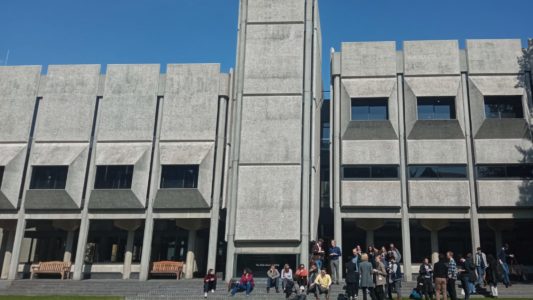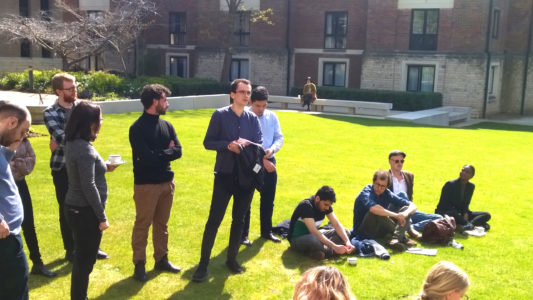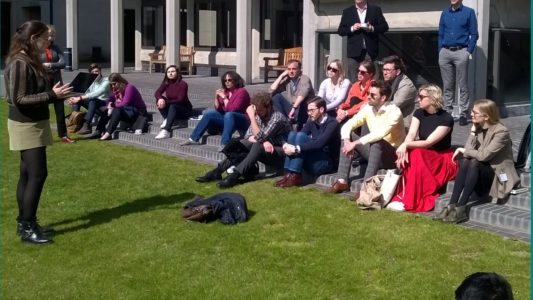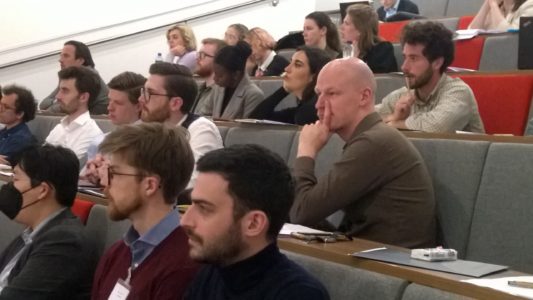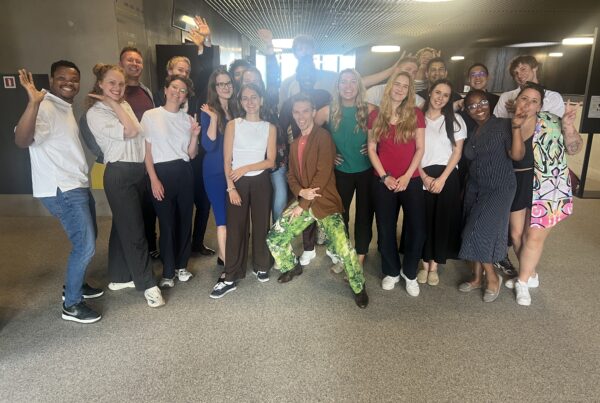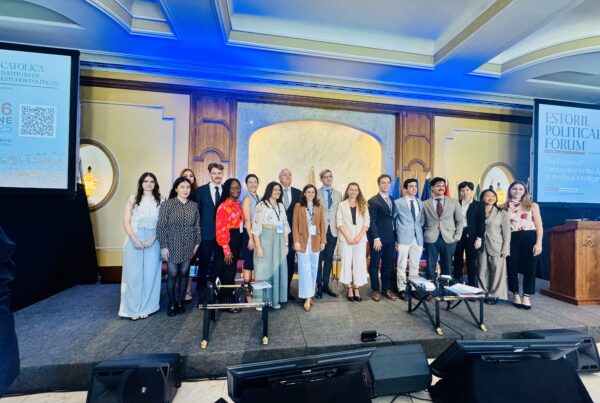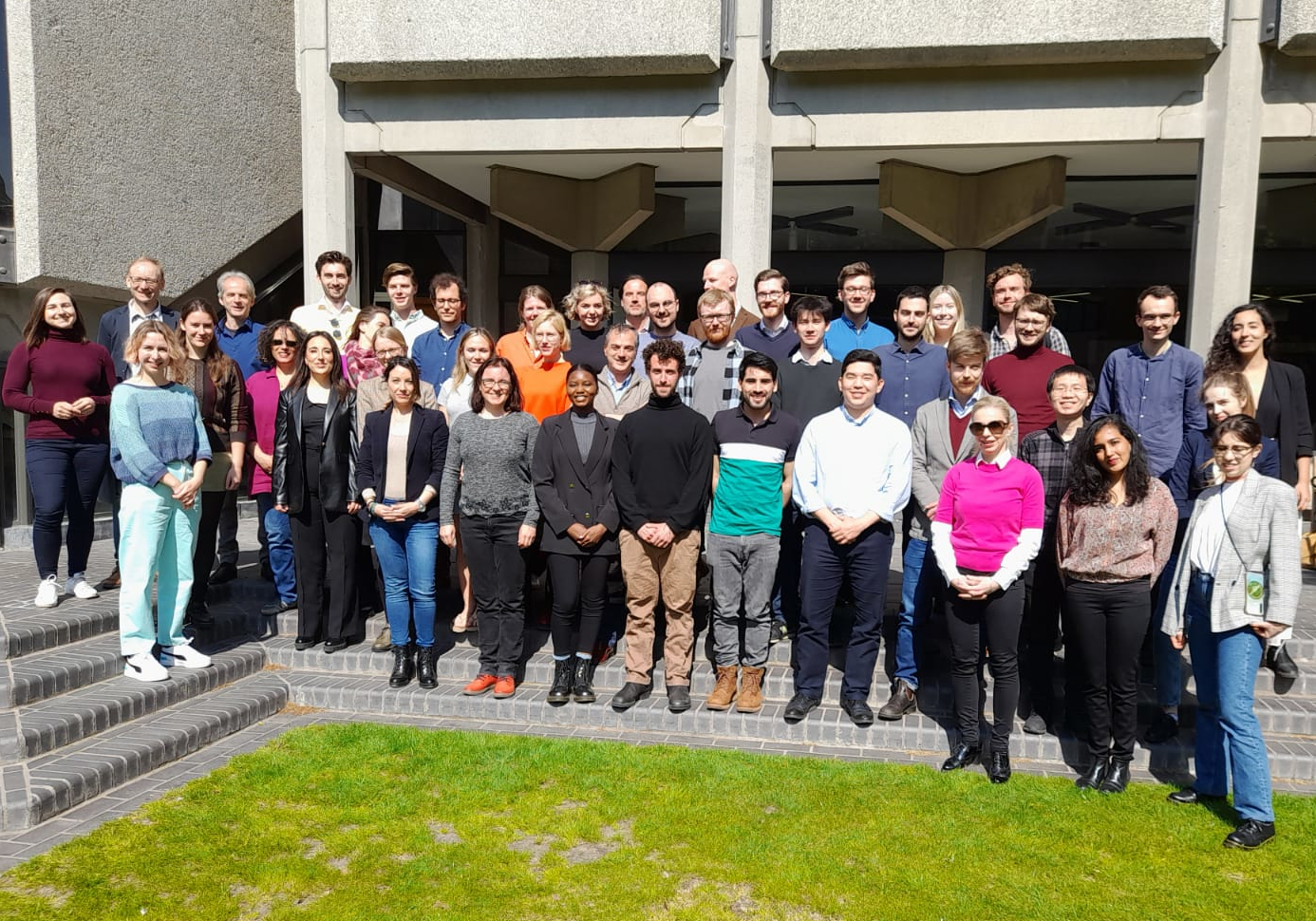
Report by Dr Dimitar Bechev, Acting Programme Director for Core Activities
On 19-21 April, the Europaeum held its annual Spring School, convened by Dimitar Bechev, Tracey Sowerby (Oxford) and Joost Augusteijn (Leiden). It was held in Oxford, hosted by Maison Française d’Oxford, whose director, Pascal Marty, welcomed the participants ahead of the opening session, and by St Antony’s College. The event explored the complex and multi-layered relationship between law and power. It brought together scholars and graduate students from a variety of disciplines including History, Law, Politics, International Relations, and Cultural Studies. Students from the following universities within the Europaeum network attended: Barcelona, Geneva, Krakow, Leiden, Luxembourg, Madrid, Munich, Oxford, Paris, St Andrews, and Tartu. The Spring School featured five keynote lectures and five panels where students gave papers on their own research. There were also breakout sessions where participants discussed issues raised by the speakers: the international response to the war in Ukraine, the power of the law to address social inequalities, and the rule of law in the European Union (EU). Students who did not participate in panels were assigned roles as discussants or presenters at the breakout sessions.
The Spring School commenced with a panel discussion focused on the historical aspects of the law-power nexus. It kicked off with a keynote lecture by Pärtel Piirimäe (Tartu) entitled Universal Norms, Inequality and Diversity of Nations in Early Modern International Law. Exploring the thought of classical theorists such as Grotius, Pufendorf, Vattel and Wolff, he considered, amongst other things, how early international law dealt with issues of empire and imperial expansion and argued it did not explicitly justify Western domination of the non-Western world. On the contrary, legal norms developed by European states laid the groundwork for the decolonisation process in the mid-20th century. Next on the panel, Isabel Bedoya Palop (PhD in History, Barcelona) presented her research about self-determination in Latin America in the 19th century and the legal and constitutional arrangements underpinning Spanish colonial presence. The panel closed with a paper by Rigels Lenja (PhD in History, Munich) discussing the historical echoes of the interwar period in present-day politics in the Balkans, including the return of authoritarian politics and great power competition.
Lenja’s paper provided a good segue into the second panel, which was on Law, Statecraft and Geopolitics, moderated by Maxine David (Leiden). It was spearheaded by a keynote talk by Eliška Tomalová and Jan Hornát (both of Charles University, Prague) on status diplomacy. Drawing on an ongoing research project studying small states in international politics, they considered the means deployed by such actors to advance their goals and gain status in an international hierarchy based on power and symbolic capital. Legal instruments, international law as a whole, as well as access to international institutions are no doubt key to such strategies. Next on the panel, Lance Bradley (MA in International Relations, Tartu) discussed the case of de facto states in the post-Soviet space. His research on the separatist entities in eastern Ukraine (the so-called Donetsk and Luhansk People’s Republics, DNR/LNR) provoked a lively discussion. The last speaker, Nataša Chmelíčková (PhD student in Law, Prague) addressed the issue of the management of asylum and migration on the eastern borders of the EU, a topic that gained prominence recently because of a crisis on Belarus’s borders with Poland, Lithuania, and Latvia.
Day Two opened with a keynote speech by Martin Conway (University of Oxford) with the title How Peace Ends: European History since 1945. Conway argued that the structural features and institutions underwriting peace in Europe for close to eight decades are eroding, including the bipolar and later unipolar structure of international politics and the influence of European integration. He highlighted the fact that Europe is surrounded by an arc of conflicts from the Sahel all the way to eastern Ukraine and Nagorno-Karabakh, and contended that we live in an age of “neither war, nor peace.” This set the scene for a vigorous debate in the following breakout session.
The third panel of the Spring School debated the relationship between law and justice through a selection of national and regional case studies. Rebeca De Mateo Peña (PhD in Criminal Law and Criminology, Madrid) gave a paper on Energy Colonialism and Ecological Justice, exploring the social and environmental impact of the green transition in the EU. She looked at the negative fallout from investment in renewable energy across rural areas in Spain. Paul Gorby (PhD in International Relations, St Andrews) debated issues of policing and public order through the lens of Political and Social Theory, considering whether institutional practices in Western democracies entrench inequalities to do with race and class. Lastly, Ambrosio Moreno (PhD in Politics and Administration, Madrid) presented on the concept of transition from closed to open orders, originally developed by the New Institutional Economics tradition, in the context of Latin America.
Panel four, on Supranational Governance and Law and chaired by Javier Arregui (Barcelona), dealt with the role of law within the EU and its member states. It was opened with a keynote lecture by Pavlos Eleftheriadis, a legal scholar at Oxford, which built on his recent book, A Union of Peoples: Europe as a Community of Principle (Oxford University Press, 2020). Considering the constitutional challenge mounted by Poland against the supremacy of EU law over national law, Eleftheriadis talked about the competing visions of how the two legal orders relate to each other. He also presented his theory of EU law as a transnational structure capable of complementing and accommodating diverse legal traditions. The panel continued with a presentation by Gonzalo Jorro Martinez (PhD in Law, Madrid) on the EU’s policies and institutional mechanisms for promoting parliamentary democracy across the globe. Jorro Martinez brought forward examples from his work as an official in the European Commission. Next, Athanasios Kalogiros (PhD in Law, Paris) discussed the European model of democracy, with a particular reference to the work of the Venice Commission, a body within the Council of Europe. Last but not least, Mauricio Mandujano Manriquez (MA in European Politics and Society, a joint programme by Leiden, Krakow, Prague and Barcelona) gave a paper based on his research into the evolution of policy upholding the rule of law in member states, a pertinent topic given democratic backsliding in Poland and Hungary.
Day Three took place at the Nissan Theatre, St Antony’s College. A stimulating keynote speech by Alina Mungiu-Pippidi (Hertie School, Berlin) debated from a critical perspective the concept of the rule of law and the policies designed by the EU to advance it both internally and externally. Drawing on her recent book Europe’s Burden: Promoting Good Governance across Borders (Cambridge University Press, 2019), Professor Mungiu-Pippidi argued for a narrower definition where rule of law is focused on judicial independence as well as mechanisms to contain corruption. Looking at examples in Europe and beyond, she contended that bottom-up processes with local and national stakeholders are more successful in upholding the rule of law in comparison with international bodies such as the EU.
The closing panel, moderated by Mihail Chiru (Oxford), returned to the topic of how public policy and regulation affects power relationships in society. Nils Langensteiner (PhD in Law, Luxembourg) talked about the regulation of tech companies with reference to online hate speech. In particular, he analysed, from a critical perspective, the case of the German Media State Treaty. Gender was in the focus of the paper by Beatriz Sánchez-Girón Martínez (PhD in Labour Law, Madrid). She discussed the impact of the digitialisation of the economy and teleworking – a surging trend thanks to the fallout from the COVID-19 pandemic – on women as well as on gender relations more broadly.
A student’s perspective
Mauricio Mandujano Manriquez
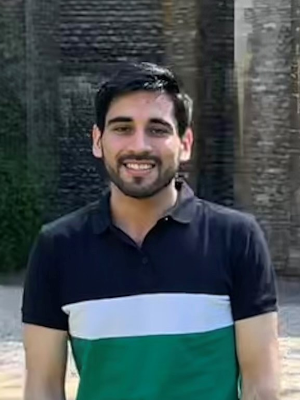
I am a 2nd year master’s student in European Politics and Society (EPS) at Leiden University. Over the last year, I began researching the interplay between the EU Rule of Law Policy and the Member States’ judicial systems. Thus, when I saw the call for the Spring School on ‘Law and Power’ I was very eager to sign up.
I enjoyed the eclectic mix of research approaches and traditions presented by the speakers in the panel sessions, reading between different topics but all around the thematic scope of law and power. The keynote presentations by leading academics in their fields that preceded each panel provided an excellent prelude for the paper presentations. In my view, this creates a vibrant atmosphere of academic discussions between professors and graduate students alike. A highlight of the week was the chance to work in a breakout group where we further discussed whether the EU could compensate for the rule of law deficits in member states, which provided plenty of insights for my own research.
Besides the aforementioned academic benefits, as an in-person event it offered networking opportunities with students from all over Europe. The coffee breaks and hallway talk in between panels were essential aspects of the event. Overall, the Spring School in ‘Law and Power’ was an excellent opportunity to broaden my research horizons and extend my research network.

